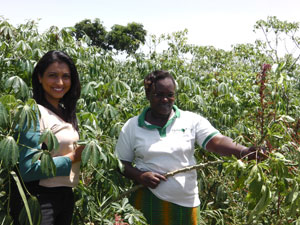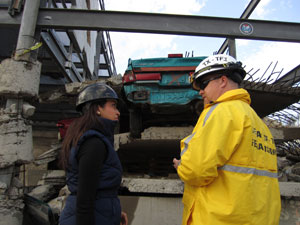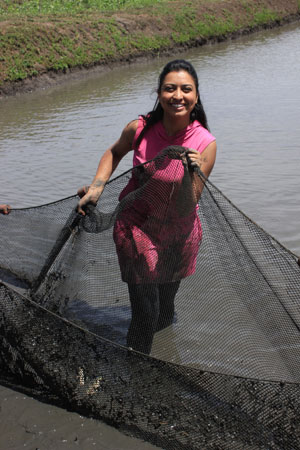Interview: Saima Mohsin
By Amna R. Ali | People | Q & A | Technology | Published 12 years ago
Saima Mohsin, the face of DawnNews, the defunct English news channel, is now a reporter onHorizons, Series 2, a programme on BBC World News about global business and innovations, which highlights issues of security, food, society, health and energy — at a global level.
Saima travels the globe in her new assignment to discover burgeoning new sciences, learn about low-tech and high tech innovative technologies and businesses across the world and hunt down the most critical challenges which mankind faces in the decade ahead. In Bangalore, India, Saima meets residents of eco-homes to discover the advantages of sustainable living and in rural Kenya, east of Nairobi, Saima looks at the low-tech approach of managing water supply by providing twenty-first century answers to growing water problems.
Teamed with renowned business journalist, Adam Shaw, the host of the programme, the duo meets CEOs, opinion-makers, scientists and people on the ground, to learn more about the future.
Newsline spoke to Saima recently to get an update on her activities.
What is some of the new technology that will impact our globe in the future which you have featured so far with your co-host, Adam Shaw, on Horizons, Series 2?
We have been looking at businesses that are really diverse, from developments in science and technology to IT, to low tech innovations in search of sustainable solutions for the future. I’ve talked to robots embodied by CEOs trying to reduce their carbon footprint, I’ve seen people who have been paralysed for decades walk with the aid of a bionic suit, I’ve seen a water pump activated by a keycard credited with cash using Mobile Money. The developments we’ve been discovering on Horizons vary from really high-tech innovations that seem like science-fiction movies to modern technology providing simple solutions to how we build our roads, homes or pump water.
China, India, Kenya, Canada — you’ve been travelling the world with Horizons. Which are some of the most thrilling locations that you’ve been to, so far?
 Everywhere we go has been a real thrill. We don’t just go to major cities but travel far off the beaten track. We have the privilege to go to countries around the world, to remote locations we wouldn’t go to as tourists. To meet the local people, especially those who are developing ideas that will change our world in the future, is simply amazing. I’ve played football with robots in Amsterdam, fished 1000 tilapia in Kenya, laid a plastic road in India and seen a transparent, flexible mobile phone keypad in San Francisco. But it’s not all glamour you know. I filmed in a sewage works in the US, climbed to the top of a mountain of waste at a rubbish dump in Mumbai and spent a lot of time trying to look comfortable at a locust farm in Amsterdam — until I had to eat one!
Everywhere we go has been a real thrill. We don’t just go to major cities but travel far off the beaten track. We have the privilege to go to countries around the world, to remote locations we wouldn’t go to as tourists. To meet the local people, especially those who are developing ideas that will change our world in the future, is simply amazing. I’ve played football with robots in Amsterdam, fished 1000 tilapia in Kenya, laid a plastic road in India and seen a transparent, flexible mobile phone keypad in San Francisco. But it’s not all glamour you know. I filmed in a sewage works in the US, climbed to the top of a mountain of waste at a rubbish dump in Mumbai and spent a lot of time trying to look comfortable at a locust farm in Amsterdam — until I had to eat one!
Search and rescue by a unique flying robot, eye surgery robotics, sustainable eco-cities, bionic exoskeleton technology — the list is astonishing? How do you think science is improving human life?
Science, technology, product development and a change in mindset are all going to improve human life. Funnily enough, I think in some ways modern developments in science and technology are righting the wrongs of past developments. Plastic, for example, was once revolutionary. Today we are in search of biodegradable plastics and ways of re-using plastic waste because it’s so harmful to our environment. I’ve come across some great and interesting ideas, from a biodegradable plastic developed from human waste (yes, that’s right, human waste) to plastic roads — old plastic bags mixed with bitumen to make longer lasting, hard-wearing roads. Both these technologies are patented and in production now. Science is really changing how we’ll live and work in the future — perhaps even how long we’ll live. Adam discovered bio-printing, where he saw a 3D copy of a human ear being ‘printed.’ Made out of cells and a unique glue-like product, the ear can theoretically be attached to a human body and function normally. It’s not been approved yet, but it’s a sneak peak into the potential for the future. I have seen paraplegics walk for the first time in 20 years, a truly inspirational moment for the team filming the show.
What, in your view, is the biggest challenge facing mankind today?
The biggest challenge we all face is a change in mindset. It’s all very well for these revolutionary products and developments offering sustainable solutions coming into production but it’s down to us, how we live and work on a daily basis. Although, climate change, food scarcity and water shortages are hot topics, we all think they’re not going to impact us. But they will and they already have.
 Filming Horizons has taught me that the smallest of changes can have the biggest impact not just for us but for the whole of mankind. For example, dealing with the mountains of waste we see strewn across streets and piling up in landfill sites — a familiar sight around the world including Pakistan. Yet, I met a group who are dealing with 90% of their own waste and sending only 10% to a landfill. They’re recycling their paper, using food waste to make compost and selling glass and plastics to local businesses. That’s something each one of us could do.
Filming Horizons has taught me that the smallest of changes can have the biggest impact not just for us but for the whole of mankind. For example, dealing with the mountains of waste we see strewn across streets and piling up in landfill sites — a familiar sight around the world including Pakistan. Yet, I met a group who are dealing with 90% of their own waste and sending only 10% to a landfill. They’re recycling their paper, using food waste to make compost and selling glass and plastics to local businesses. That’s something each one of us could do.
Q: What do you enjoy most about this documentary-style presentation and the hands-on experience with new people, places and ideas?
Horizons is filmed all over the world with two cameras and it’s a very natural style with mostly hand-held filming. The poor crew get sore arms but it looks great! The cameras take the viewer with me on a journey of discovery with the people I meet as they talk me through their innovative solutions for the future. It’s very much my style and why I became a journalist — to meet new people, hear about their views and understand their stories. I did a lot of filming like this in Pakistan too. I love being on the road and meeting the people who are impacting our world. But the great thing about Horizons is that we have more time to spend on each story and get more in-depth to discover ideas that will change the world. I also get very involved in the stories, I attempt to try the technologies out myself and put them to the test.
Q: How does your experience as a presenter at Horizons, Series 2 on BBC World News compare with your hard news assignments at DawnNews?
A: Horizons is a little different from the days of interviewing Benazir Bhutto and Hillary Clinton. DawnNews was a 24-hour channel; we were on air during some of the most tumultuous years Pakistan has ever known, with breaking news happening at two-minute intervals! It was fast-paced, hard news that asked tough and challenging questions and I think my team and I did a good job with NewsEye. Horizons is produced and developed at a much more relaxed pace. Although we were up from six a.m to midnight everyday, travelling from city to city, we had more time to film and investigate each business idea we came across. Horizons is all about the business of sustainability and companies who make it their business to find sustainable solutions.
 How does Pakistan compare to other locations in innovative technologies and businesses. Do you believe that some of the innovations and futuristic ideas you have seen so far can be replicated in Pakistan to resolve energy, food, water, and housing and environment issues?
How does Pakistan compare to other locations in innovative technologies and businesses. Do you believe that some of the innovations and futuristic ideas you have seen so far can be replicated in Pakistan to resolve energy, food, water, and housing and environment issues?
I haven’t looked into innovation and sustainable solutions in Pakistan yet, but I’d love to filmHorizons in Pakistan. The best thing about almost all the films I’ve made for Horizons is that these solutions could be adapted to anywhere in the world. I spent a lot of time on location thinking, “this would be perfect for Pakistan.” We have seen a lot of innovative solutions, many in their infancy, and the hope is that in the years to come they’ll be scalable and adapted to help other countries and regions.
You are a British-Pakistani and have lived and worked in both places. How do you straddle both cultures at the same time?
Well, I am both identities, so being able to adapt to both cultures at the same time is not that difficult. It does sometimes pose challenges, but I see being very British and very Pakistani as a benefit. I appreciate both cultures, peoples and ways of life. There is good and bad in both and I learn a lot from both countries. “Jaisa des waisa bhess.”
Q: What does it mean to be a global citizen? And what does it take to be one?
This is massive question. I’m not sure I’m qualified to answer it or that I can in one short answer — it’s a thesis! But I can try. I think we need to realise that everything we do has an impact on other people and on mother earth. We need to consider where the food on our table is coming from, how far it travelled to get to us and how it’s being grown. Where does the water we use come from and go to? What about the waste we produce? We throw it in the bin and forget about it. But it has to go somewhere. What about the modes of transport we use to go to work and school? We take modern developments for granted.
If we just take responsibility for our own lives and ask these simple questions we can make a huge difference to being responsible citizens. The term global citizens comes from the fact that we are no longer people living in isolated societies and communities. We are connected to other towns, cities, countries and continents like never before. We all have a global responsibility. For example, Pakistan is one of the lowest contributors to global warming but will be one of the worst affected. Countries that are the major contributors to carbon emissions, I feel, have a responsibility to other countries to act and act fast to reduce the damage they are doing to the rest of the world.
This interview was originally published in the July issue of Newsline.
Related Articles:
The writer is a former assistant editor at Newsline


